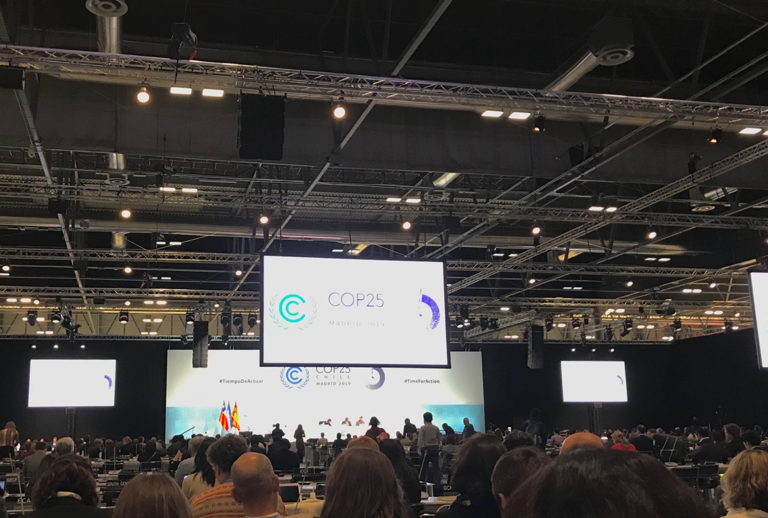Attending COP25 was an intellectual rollercoaster, and my biggest takeaway from this experience was understanding the fundamental conflict in striving for balance: global frameworks vs. local achievements; specific, efficient action vs. comprehensive, systemic change; ambition fueled by urgency vs. taking time to build consensus. Reflecting upon my week at COP25, I am struck by the distinctive character of these debates and negotiations. There is no argument brooked regarding the existence or severity of the climate crisis, but there is an inherent tension in balancing ideology and pragmatism which I think was thrown into the spotlight at COP25. My own decisions reflected this tension as I spent about half of my time attending the side events, populated largely by activists, academics, and the private sector (with some representation from national governments) and the negotiations themselves, which were often limited to high-level civil servants and policy wonks.
Even in terms of the logistical setup, the negotiation rooms were separated from (although connected to) the side events, country pavilions, and research panels. Moving between the two areas was an exercise in contradictions, as the Article 6 negotiations (which aim to establish an international carbon market mechanism) were concerned with purely reducing greenhouse gas emissions quickly and efficiently, whereas the larger side event areas seemed to be emphasizing a much broader agenda focused on global climate justice and environmental degradation. This is not necessarily unexpected; it makes sense for the United Nations to encourage these discussions in an effort to foster inclusivity and diversity. And while the side events seemed to be concerned with more ‘big picture’ issues with globalization, capitalism, and historical oppression, they also grounded these debates in local, community-based experiences and examples. This is in direct contrast to the Paris Agreement negotiations themselves, which are concerned with the pragmatic task of setting up a global framework for reducing emissions and adapting to impacts that could be flexible enough to work in all contexts, all the time.
I was struck by the contradictions between these two ideals: grassroots, context-specific calls for climate justice on the one hand, and high-level, specific discussions regarding the minutiae of carbon markets on the other. Having said that, there were some panels and side events dedicated to the same topics that country negotiators were discussing, like the Warsaw International Mechanism for Loss and Damage that addresses the already unavoidable impacts from extreme events in developing countries, or the Adaptation Fund that increases developing countries’ capacity to implement adaptation measures. However, for the most part the tone of the two areas seemed completely distinctive, and often at odds with each other.
Again, this tension is not necessarily a bad thing; it is good to have multiple approaches, worldviews, and ideologies represented at COP25, both to hold policymakers to account and to provide a platform for historically marginalized groups who have struggled to find a seat at the table. However, I would have liked to see more of an effort to bridge the gap between the grassroots ideals of climate justice and the macro-level focus on international frameworks. I think that there was room for more mid-level discussions on bridging theory and practice, ideology and pragmatism, giving the option for both the energy of community-led movements and the structure of international treaties to be used in concert to avoid climate catastrophe, and transform the underlying systemic paradigms that induced climate change in the first place.

At the end of the day, I think COP25 has done a pretty decent job of allowing everyone to speak to their experiences with climate change, while also acknowledging that ultimately the country negotiators are there to accomplish a much narrower set of tasks. Having said that, there is room for improvement going forward with regards to integrating these larger anxieties regarding climate justice and systemic inequalities into the United Nations. Due to the historically lackadaisical approach from international organizations and national governments, a certain loss of faith in those institutions from activists and marginalized groups is expected. But there does seem to be a newfound sense of urgency, ambition, and inclusiveness from the COP, epitomized by UNFCCC Executive Secretary Patricia Espinosa imploring the attending nations that “we need your decisions. We need your leadership. We are out of time."

Janetta is a PhD candidate in the Department of Geography & Environmental Management, working in the SPROUT lab with professor Sarah Burch. She attended the 25th Session of the Conference of the Parties (COP25) United Nations Climate Change Conference in Madrid Spain during fall 2019. This is her reflection from participating as a student delegate.